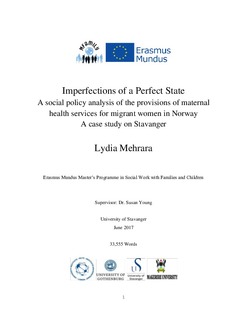| dc.contributor.author | Mehrara, Lydia | |
| dc.coverage.spatial | Norway | nb_NO |
| dc.date.accessioned | 2017-08-14T09:09:58Z | |
| dc.date.available | 2017-08-14T09:09:58Z | |
| dc.date.issued | 2017-06 | |
| dc.identifier.uri | http://hdl.handle.net/11250/2450604 | |
| dc.description | Master's thesis in Social Work with Families and Children | nb_NO |
| dc.description.abstract | Background: The increasing ethno-cultural diversity in European societies has posed new challenges for their health and welfare systems. As of January 2017, migrants constitute 16.8% of Norway’s total population (SSB, 2017a). Studies show that despite the availability of maternal care and legal migrant women’s right to access reproductive health services in most European countries, including Norway, migrant women have been found to exhibit different perinatal outcomes, and patterns of antenatal care utilization compared to non-migrant women (Dejin-Karlsson & Östergren, 2004; Rechel et al., 2011c).
Migrants are affected by an array of challenges that might act as barriers to attaining good health outcomes, even in an egalitarian society like Norway. Socio-economic inequalities are the most prominent issues discussed in policy for addressing barriers to access. Although they are important they tend to overshadow more nuanced factors such as linguistic and/ or ethno-cultural barriers for targeting inequalities. My literature search revealed that there is an inadequate body of research exploring the effects of more implicit and informal social determinants such as ethnicity and culture linked to migrant health. Although some studies acknowledged them as determining factors, none analyzed or evaluated how they have been addressed in policy. Therefore, it became the aim of this study to contribute to this knowledge gap by exploring:
1. How has health policy in Norway recognized and addressed barriers that affect migrant and refugee women’s access to maternal health services?
2. How have these policies enabled accessibility and acceptability of maternal health services to migrant and refugee women?
Methods: I developed an instrumental case study using the provisions of maternal health care in Stavanger to illustrate Norwegian health policy. I analyzed the data using a policy analysis framework before subjecting them to further critique, using my conceptual framework containing four theories for understanding.
Results: There is a contradiction in the assumption that universal provision enables equal and effective access. Norway’s universalistic approach to health policy has inadvertently resulted in a degree of ambiguity in the ethos of equity and equality, which has overlooked intricate determinants of health at the micro level of society. Consequently, this has led to the formation of loopholes in the theoretically equitable healthcare system, through which a fraction of population, particularly people from migrant and refugee backgrounds fall. Hence, this approach to equity imposes weakness to the principle of universalism and further deepens inequality.
Conclusions: It is time to challenge the underlying principles of health policy to elicit realization of inequality and induce action for promoting equity by addressing the needs of a diversifying society through multidisciplinary interventions and targeted approaches to universalism. | nb_NO |
| dc.language.iso | eng | nb_NO |
| dc.publisher | University of Stavanger, Norway | nb_NO |
| dc.relation.ispartofseries | Masteroppgave/UIS-HF-IS/2017; | |
| dc.rights | Navngivelse 4.0 Internasjonal | * |
| dc.rights.uri | http://creativecommons.org/licenses/by/4.0/deed.no | * |
| dc.subject | sosialt arbeid | nb_NO |
| dc.subject | familier | nb_NO |
| dc.subject | helse- og sosialfag | nb_NO |
| dc.subject | kvinnehelse | nb_NO |
| dc.title | Imperfections of a Perfect State: A social policy analysis of the provisions of maternal health services for migrant women in Norway - A case study on Stavanger | nb_NO |
| dc.type | Master thesis | nb_NO |
| dc.subject.nsi | VDP::Social science: 200::Social work: 360 | nb_NO |

